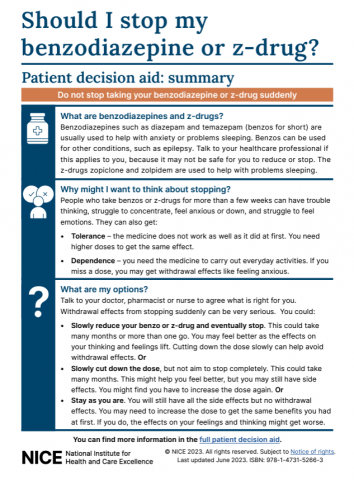The National Institute for Health and Care Excellence (NICE) has published a new patient decision aid for people who are on sleeping pill prescriptions.
The decision aid has been rolled out to support people taking benzodiazepines and Z-drugs (zolpidem or zopiclone) and help them better understand the effects of keeping their dosage the same, reducing it or stopping it altogether.
A one-page summary has been published alongside the overall guidance, marking the latest work as part of NICE’s dependence and withdrawal guidelines that was first published last April.

The launch of the decision aid is also connected with the work around NHS England’s framework centred around reducing the number of prescriptions for medicines linked to dependence or withdrawal.
To support that line of action, the health service is asking GPs and clinical pharmacists to provide patients with a personalised review of their medicines to enable shared and better decision-making, which NICE believes will be aided with its new launch. Psychotherapy and sleep clinics are being offered as alternatives.
“Benzodiazepines and Z-drugs can prove crucial in aiding sleep, but part of our ongoing work with NHS England and other partners is to ensure that people’s prescriptions are regularly reviewed to assess whether treatments remain necessary and effective,” said NICE’s chief medical officer, Professor Jonathan Benger.
The steps to curb prescriptions are already telling with data showing that, between 2017/18 and 2020/21, the number of patients on benzodiazepine dropped by 20% from 1.4 million to 1.1 million – Z-drug prescriptions also saw a 2.3% reduction over the same period.
Dr Adrian James, who is the president of the Royal College of Psychiatrists which helped in the development of the decision aid, added: “As with many other medications, we need to balance the potential benefits and risks of harm from starting, continuing and stopping benzodiazepines and Z-drugs.
“This guide will help individuals have discussions with their clinicians about potential risks and benefits of these medications."
Image credit: iStock



















